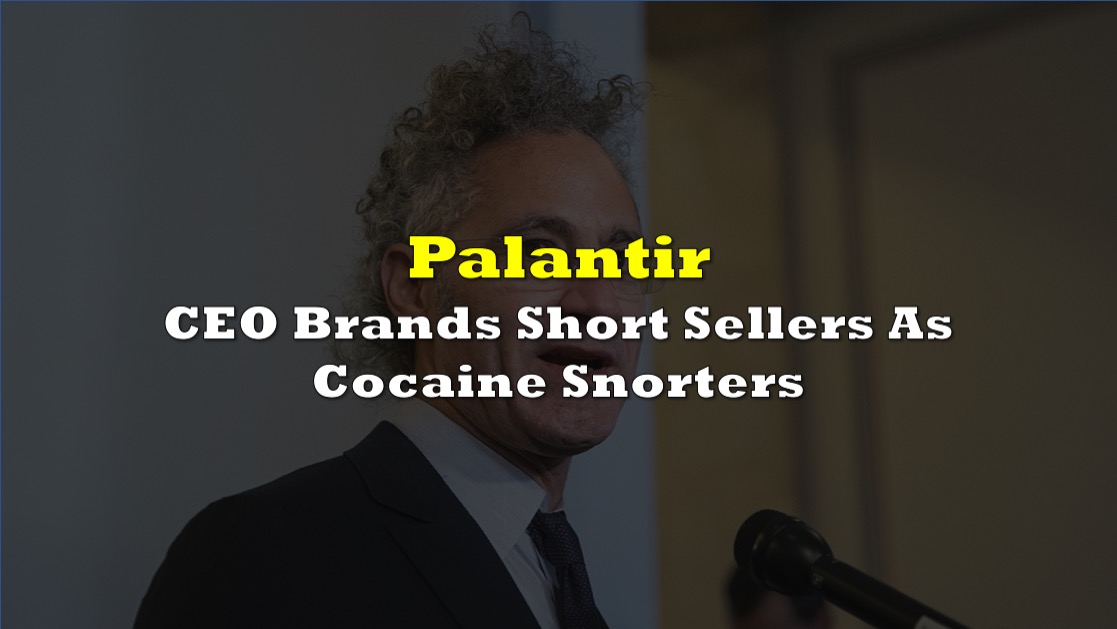In a recent interview with CNBC, Palantir Technologies (NYSE: PLTR) CEO Alex Karp stirred controversy with his candid remarks, both on the topic of short sellers and the company’s stance on Israel, shedding light on the ongoing dynamics within the tech giant.
Karp’s comments about short sellers veered into unconventional territory, as he expressed a certain satisfaction in “burning” them, likening it to depriving them of a stimulant. He further suggested a punitive measure by insinuating that Palantir would lead their financial troubles to their doorsteps.
Alex Karp, CEO of Palantir, ranting on CNBC about short-sellers destroying American businesses so they can fund their cocaine habitspic.twitter.com/Mqx6kr4sif
— BuccoCapital Bloke (@buccocapital) March 13, 2024
“Almost nothing makes a human happier than taking the lines of cocaine away from these short sellers, who are going short on a truly great American company — not just ours — they just love pulling down great American companies so that they can pay for their coke,” Karp said in the interview.
He added that the “best thing that can happen to [short sellers] is… lead their coke dealers — to their homes, after they can’t pay their bills.”
Short selling is a trading strategy where an investor borrows shares of a stock from a broker and sells them on the market, with the intention of buying them back at a lower price in the future. The investor hopes to profit from the difference between the selling price and the eventual lower buying price, essentially betting that the stock’s price will decline.
In response, X user @John_Hempton, who disclosed himself as the manager of “one of the biggest short selling books in the world,” maintained that he “never snorted cocaine.”
“My guess is projection – but not hanging around cocaine snorting parties I have never seen Alex Karp snorting cocaine,” he added.
Disclose:
— John_Hempton (@John_Hempton) March 13, 2024
a. I run one of the biggest short selling books in the world
b. I have never snorted cocaine.
My guess is projection – but not hanging around cocaine snorting parties I have never seen Alex Karp snorting cocaine.
Have you? https://t.co/gGEUZpqBVM
Palantir last traded around the $25-mark, a 50% year-to-date jump and a 216% surge from last year.
It is worth noting that in February 2024, Karp sold over a million of his shares in Palantir, worth around $24.7 million in total, with this week director Peter Thiel sold off $174.6 million in shares.
Peter Theil dumps over +$170m in $PLTR stock. Karp keeps dumping, too. pic.twitter.com/W0fj96Hq1p
— The Maverick of Wall Street (@TheMaverickWS) March 13, 2024
“Stands with Israel”
Consistent with his controversial moves, Karp addressed the issue of employee turnover at Palantir, particularly those departing due to the company’s public support for Israel. Amid escalating conflicts, Palantir has openly backed Israel, a stance that has prompted internal discord.
Palantir, renowned for its government contract work, has extended its technology to support various military operations, including those of Israel and Ukraine. The CEO’s unwavering support for Israel has evidently triggered dissent within the ranks, leading to resignations.
“We’ve lost employees. I’m sure we’ll lose employees,” Karp said in an interview. “If you have a position that does not cost you ever to lose an employee, it’s not a position.”
Karp’s unapologetic demeanor in defending Palantir’s stance on Israel reflects a broader trend of corporate leaders taking public stances on contentious issues. Palantir’s engagement in supplying technology to Western allies “only”, coupled with its strategic partnership with the Israeli Ministry of Defense, underscores the commitment to one side of the conflict, despite internal and external criticism.
Furthermore, Palantir’s recent lucrative contract with the U.S. Army highlights its continued relevance and influence in the defense sector, further bolstering Karp’s conviction in his company’s mission.
During said interview, Karp reiterated his support for Israel when it was brought up that the company placed a full-page advertisement in The New York Times in October affirming that it “stands with Israel.”
“We’re going to get as close to telling you how we see the world as we’re legally and ethically allowed to,” he said. “We also do this externally.”
Karp’s outspoken nature isn’t new; he has a history of vocalizing opinions on social and political matters, often positioning Palantir in stark contrast to the prevailing sentiments in Silicon Valley. From relocating the company’s headquarters to Denver to emphasizing collaboration with the federal government, Karp’s leadership reflects a deliberate departure from the norms of the tech industry.
Information for this briefing was found via CNBC and the sources mentioned. The author has no securities or affiliations related to this organization. Not a recommendation to buy or sell. Always do additional research and consult a professional before purchasing a security. The author holds no licenses.









